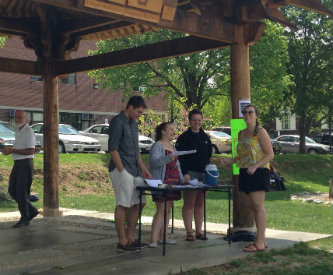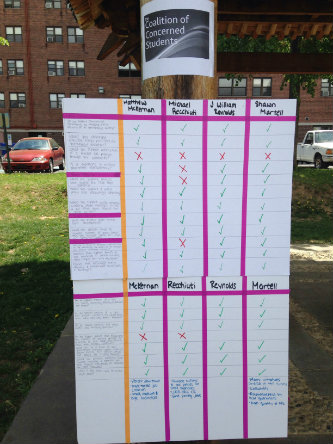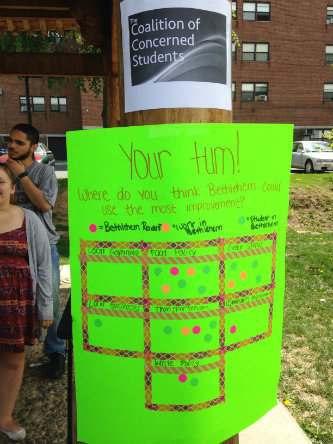Battling brain drain
When you want to bring about change, start by asking questions. Seven Lehigh students recently did just that.
As part of their senior seminar in the Environmental Studies (ES) program, Kate Armbruster ’15, Charlie Baldwin ’15, Heather Doll ’15, Layla Gonzalez ’15, Maggie Gurule ’16, Samuel Horstmann ’16 and Matt Moschella ’15 started the Coalition of Concerned Students with students from other area colleges. Through their collaboration, they gathered data and publicized information on the environmental leadership of political officials and candidates in the Lehigh Valley.
Throughout the course of their studies in the ES program, each student focused on an environmental topic that most interested them. Topics included climate change, sustainability, community engagement, air quality, food policy, transportation, waste management, green buildings and green business. Encouraged by faculty to engage in a final project that pertained to these issues and could be applied to the local community, students devised their plan.
“We wanted something more concrete out of it,” says Gonzalez.
The group wanted to know where local politicians stood on issues that impact brain drain, the phenomenon in which educated young professionals leave a particular city and move to another with better pay or living conditions. Students decided to approach candidates running for office in the upcoming local elections in Northampton and Lehigh counties with a survey addressing the brain drain problem. Their goal was “to gauge the importance political candidates attach to policies that support and foster community involvement in government decisions, transportation, local commerce, planning for sustainability and other goals that make for thriving cities.”
Students researched metropolitan areas that are popular with young professionals such as Seattle, Denver, Pittsburgh, Portland and Raleigh and identified the features that college graduates find attractive: healthy eating options, a commitment to climate and environmental protection, infrastructure that allows for easy navigation, and sizeable green spaces, among others.
Using this information and their knowledge about particular issues, each member of the group wrote questions to include in their survey. They also received questions from students at Muhlenberg College, Lafayette College and Northampton Community College and adapted them for the survey.
“In framing it as a brain drain issue, it seems that the questions that we were posing are questions that people our age have and that Pennsylvania is not able to answer efficiently,” says Gurule. “We used the survey as a way to bring attention to them as a generational thing, not necessarily as a group of environmental studies majors. We really wanted to showcase that it’s an interest across the board and that it’s not just a small group of students from Lehigh’s campus who care about this.”
“There’s definitely a big generational gap in terms of knowing strategies that minimize environmental impact or knowing the effects that these things can have on the economics of your city and what your city’s demographic is going to be, depending on how you make decisions,” says Doll, who published an op-ed on brain drain in The Morning Call.
Reaching out
Students quickly realized that a large part of their challenge was the candidates’ accessibility.
Gonzalez describes the process as “not impossibly difficult, but very close to impossibly difficult.” Many candidates’ email addresses and phone numbers were difficult to find, she says, and even when they obtained contact information, they had “no response the majority of the time,” even with multiple attempts.
“It’s really hard because you want to be involved in your community, but the odds are stacked against you,” says Gonzalez.
Doll agrees. “If you want to ask [candidates] about something, some of them don’t have websites or events,” she says. “To not be able to access any information, any phone number, any means of finding out how they feel about anything is frustrating because you’re really just blindly voting.”
The results
Of the approximately 40 surveys the group sent to candidates in the City of Bethlehem, Bethlehem Township, Allentown, Lower Macungie Township and Easton, they received only 12 responses, most from the City of Bethlehem.
“The process of compiling the survey and getting responses has been a good lesson in gauging the responses and responsiveness of elected officials to their constituents,” says Armbruster. While some candidates agreed with the students’ ideals, they cited budgetary concerns. Other candidates had different opinions.
“One politician commented on the survey that ‘it’s sad that students are being taught this liberal philosophy... It saddens me which direction educators are taking young minds,’” says Armbruster. “I have an honest interest in promoting a local food policy council and preserving farmland, and to be told [this] completely undermines my experiences as a resident and contributor to the community.”
This type of response, however, only spurs Armbruster on to “inform fellow students and community members of how our politicians and candidates think of important issues,” she says.
Students shared the results of the survey with the local community at an event on the South Bethlehem Greenway on May 9. Community members were invited to learn candidates’ positions and share their own views on which issues were most important.
“For a program like Environmental Studies, addressing problems that range from improving local quality of life to protecting the planet, the challenge of participating in local politics helps the students recognize—as ES students inevitably must—that protecting our environment and our future requires collaborative, organized effort and quality community leadership,” says Al Wurth, professor of political science. “It's a great start, but I hope we can cover more candidates and races and recruit more students from other colleges for the next election.”
“This is a project that can keep going, definitely something that younger students can take on and really further. They may even be more successful,” says Gonzalez. “They can build on what we’ve done.”
Posted on:




